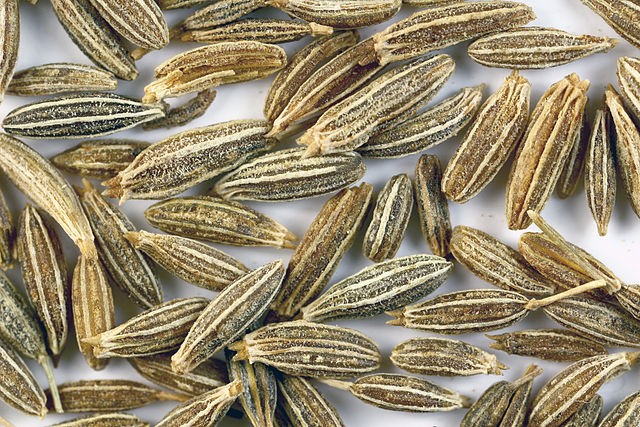Cumin (Cuminum cyminum) is a popular spice that not only adds a rich, warm flavor to dishes but also offers several potential health benefits due to its nutritional value. Here’s an exploration of the health benefits and nutritional value of cumin:
Nutritional Value of Cumin (per 1 tablespoon, whole seeds):
- Calories: 22
- Carbohydrates: 2.6 grams
- Fiber: 0.6 grams
- Protein: 1.1 grams
- Fat: 1.3 grams
- Vitamins and Minerals:
- Iron: 1.4 milligrams (7% of the Daily Value)
- Manganese: 0.2 milligrams (10% of the Daily Value)
- Calcium: 56 milligrams (6% of the Daily Value)
- Magnesium: 22 milligrams (6% of the Daily Value)
- Phosphorus: 37 milligrams (4% of the Daily Value)
- Potassium: 94 milligrams (3% of the Daily Value)
- Vitamin C: 2.1 milligrams (4% of the Daily Value)
- Vitamin A: 37 international units (1% of the Daily Value)
Health Benefits of Cumin:
- Digestive Health: Cumin is known for its digestive benefits. It can help alleviate indigestion, bloating, and gas. Cumin seeds contain compounds that stimulate digestive enzymes, promoting more efficient digestion.

- Antioxidant Properties: Cumin is rich in antioxidants, including flavonoids and polyphenols, which help combat oxidative stress and protect cells from damage.
- Anti-Inflammatory Effects: Some research suggests that cumin may have anti-inflammatory properties, making it potentially beneficial for conditions related to inflammation, such as arthritis.
- Blood Sugar Control: Cumin may help regulate blood sugar levels. It can stimulate insulin production, improving glucose utilization and lowering the risk of diabetes.
- Cholesterol Management: Cumin has shown potential in reducing levels of LDL (bad) cholesterol, which can contribute to heart health.
- Weight Management: Cumin may aid in weight management by increasing metabolism and reducing appetite.
- Respiratory Health: Cumin is traditionally used to alleviate symptoms of respiratory conditions, such as colds, coughs, and asthma.
- Iron Absorption: Cumin contains iron and enhances the absorption of this vital mineral. This can be particularly beneficial for individuals at risk of iron deficiency or anemia.
- Antibacterial and Antifungal Properties: Cumin has natural antibacterial and antifungal effects, which can help protect against infections and promote oral health.
- Gut Health: Cumin may support a healthy gut by promoting the growth of beneficial gut bacteria.
It’s important to note that while cumin offers these potential health benefits, it is not a substitute for medical treatment or a balanced diet. Including cumin as part of a diverse and well-rounded diet can contribute to overall health and well-being.
Cumin can be incorporated into your diet in various ways, such as using it as a spice in cooking, steeping it in tea, or adding it to homemade spice blends. Whether you enjoy its flavor or seek its health benefits, cumin is a valuable addition to your culinary and wellness repertoire.











